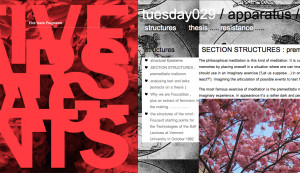
Book Launch: Five Years: Fragments
Saturday 21 June 2014, 1.30–6pm
Five Years launches the book Fragments. The publication collects together material generated through five collaborative projects, each initiated by an individual member of the co-operative group.
Fragments reflects an ethos that is central to Five Years’ organisational principles, with individual artists exercising creative autonomy in relation to a communally adopted overall structure. In response to a basic initial brief, the participants invited artists working in fields beyond the broad parameters of contemporary ‘fine art’ practice to work with them in dialogue, using one-to-one conversation as a starting point for the de-velopment of new work.
The publication is divided into five main sections, which have been edited and designed by each pair to re-flect the specific and divergent trajectories their projects have taken, integrating edited transcripts of conver-sations between the participants with work and working material produced in the process of collaboration. These projects have also been made manifest beyond the publication in forms including exhibitions, online projects, performances and participatory events.
The book launch will be preceded by a series of short presentations by the contributors as preliminaries to an open round table discussion about the project’s processual, fragmentary nature relative to the arguably ro-mantic, ‘utopian’ propositions implicit in Five Years’ organisational structure. The conversation will be chan-neled by guest artist/writer Dean Kenning.
Event Schedule:
1.30-2.30pm: Presentations by Edward Dorrian & Amy Todman, Rochelle Fry with Squares & Triangles, Marc Hulson & Paul Curran, Esther Planas with Tuesday 029, Sally Morfill & Karen Wood, and Francis Summers.
2.45-4pm: Open discussion chaired by Dean Kenning
4-6pm: Book launch and drinks
Founded in 1998, Five Years has a long history of engagement in the field of artistic co-operation and col-laboration, and its activities extend beyond the physical gallery space which is its base: the current project presents a potential model for future development. Fragments reflects on the structural intricacy of creative dialogue, revealing rupture and misunderstanding alongside productive or serendipitous dynamics. Or, what may be termed a collective yet dissensual form of ‘research’.